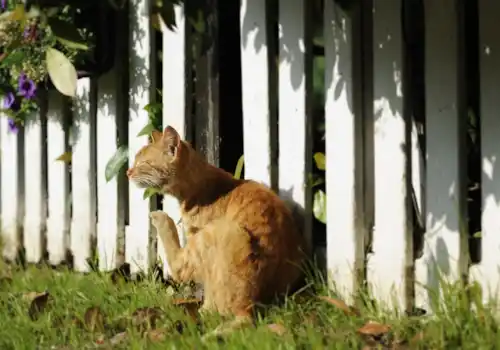Teach your cat to come when called. Cat training made easy.
Training pets to come to us when we call them is something tended to be reserved for dogs. However, it can be a really important thing to train our cats to do. Why? Have you ever spent half the evening at the back door calling your cat so you can get him home safe for the night, or spent half the night awake worrying about him as he hasn't come home?
Or have you ever rushed around the house looking under every bed and wardrobe unable to locate your cat, worrying that he has got out or become stuck in a cupboard, only to find him lying under the duvet on your bed? If any of this rings true, then training your cat to come when he is called would be invaluable.
I use it a lot with my two cats who are only allowed outside when I am at home. I was completely devastated at losing a cat to a road accident a few years ago, and so I am always keen to know where my cats are, although I do like them to enjoy time outside. In attempting to prevent them from straying too far away when they are outside, I have trained both to come when called, which means I can get them to regularly 'check in' with me, never stray too far from the house and come running for the final bedtime call.
It is a great task to train as it teaches your cat that coming to you is a really rewarding experience and helps strengthen your relationship. It is just as useful a task with indoor cats.
Finding the 'super power' rewards
The first step, as with all of our training tasks, is to ensure you have some really exciting rewards. This is vital if you are going to use your recall outdoors as many cats find being outside really exciting, with space to run and play, exciting smells and sights to explore, as well as an opportunity to hunt. Therefore, you need to have a selection of rewards that are even more exciting than these outdoor opportunities so that your cat really does deem it worthwhile to come back to you.
Earlier in this series of articles, we showed you how to train your cats to find being handled a positive experience, and I explained about ensuring the rewards were not so exciting that it made handling the cats difficult (for example, using play as a reward could risk being scratched if your cat is?still excited from the play).
However, in the case of the recall, we want to use those 'super power' rewards. Find out what treats your cat loves most (be it a small piece of chicken, prawn or ham) and what games he likes best - for example, a fast game of catch with a dangling toy on a wand, or the opportunity to chase a ping-pong ball.
Begin to train
First, choose the word you will use as the command to come to you. It's best to avoid using only your cat's name, as he may not understand that you want him to approach you. Thus, calling the name is just used to get the cat's attention and then a new special word becomes the command to come to us. It can be any word, but is likely to be most effective if you do not regularly use it at other times with your cat - 'come' and 'here' are quite commonly used.
At first your cat will not know what this new word suddenly being directed at him means, so you'll need to teach him. Start your training at a time when your cat is keen to interact with you. Place yourself at the cat's level on the floor and call his name to get his attention. Then use your chosen command. Follow this immediately by what you normally do to get your cat to come to you: some owners rub their fingers together, for example. As soon as your cat reaches you, reward with your chosen treat.

If your cat does not normally come to you easily, try luring him using a food treat or a game. Say his name followed by your command and then show your cat the food you have - let him sniff it but do not let him eat it until he is beside you. If you wish to use a game, entice your cat to come to you by moving the toy and play with him once he approaches you.
For a cat that is more nervous of approaching, build this stage up gradually by placing several treats in a path towards you after saying your cat's name and command. Gradually, you will be able to remove the lure.
Once this is working reliably and your cat is coming to you on hearing his name and command, start to increase the distance between you, eventually from different rooms in this house. Having rewarded your cat for coming to you, give him the opportunity to leave again if he wishes. You don't want him to think coming to you means restraint but instead leads to something tasty or fun.
Training your cat outdoors
If your cat has outdoor access and you are at the stage where your cat will come to you from different locations in your house, it is time to start trying it outdoors. Start in your garden while your cat is still close to the house. You started your training in the home at a very close distance to your cat and when he was hungry, feeling affectionate or playful, so do the same outside. Try it in many locations in the garden, luring your cat in different directions including towards the door of the house.
It is really important to use your 'super power' rewards now you are outdoors. When your cat comes to you, reward and praise then let him explore again. It is really important to recall your cat at times when you do not actually need him to come indoors so that he does not learn that coming to you always ends in being brought inside. This could be considered by your cat as 'a negative end' to his reaction, which could cause the power of your recall to diminish.
Initially you may just reward your cat for coming to the door, but build this up to rewarding him for coming into the house and give him his reward inside. This way you prevent creating the situation where the cat will come to you but not come inside.
Create an association between the reward and with being inside by giving it to your cat once his paws are over the threshold. Make the recall as exciting and fun for your cat as possible. You can do this by varying the rewards you use so that he doesn't always know what he is going to get as this can make the game even more enticing.
Once the recall is fully established, you do not need to reward the recall with a treat every single time your cat comes. This will keep him interested in the task as he'll never quite know which recall will bring the treat. However, only go to this stage once you can reliably get your cat to come whenever you call him. If at any stage he stops coming when you call, go back to the initial training stages.
While training a recall is not a fail-safe way to ensure your cat always comes home when he is outside, it certainly helps, while also providing fun and quality time for you and your cat. Most owners tend to play with their cats indoors, so by playing these recall games outside, we can hopefully encourage our cats to stay closer to home because for them it's worthwhile being within ears' reach just in case there may be a reward to be had!








